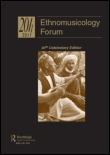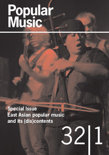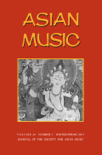
FOLK MUSIC JOURNAL
Scope & Guideline
Unveiling the Stories Behind the Songs
Introduction
Aims and Scopes
- Exploration of Folk Music Traditions:
The journal delves deep into various folk music traditions from around the world, documenting their historical evolution, cultural significance, and community roles. - Socio-Cultural Analysis:
It focuses on the socio-political contexts of folk music, analyzing how these musical forms intersect with issues of identity, migration, and social change. - Archival Research and Documentation:
The journal emphasizes the importance of archival materials, presenting research that uncovers lost or underrepresented folk traditions and song collections. - Interdisciplinary Approaches:
FOLK MUSIC JOURNAL employs interdisciplinary methodologies, integrating perspectives from musicology, cultural studies, history, and anthropology. - Pedagogy and Community Engagement:
The journal supports discussions around teaching folk music, community engagement, and the transmission of traditions to future generations.
Trending and Emerging
- Cultural Identity and Folk Music:
There is a growing trend towards exploring the role of folk music in expressing and shaping cultural identities, particularly in multicultural contexts. - Folk Music and Political Activism:
Recent publications increasingly address the connections between folk music and political movements, highlighting how traditional songs serve as tools for social change. - Digital Archiving and Accessibility:
Emerging research focuses on digital archives and the accessibility of folk music resources, reflecting the impact of technology on preservation and dissemination. - Community-Based Folk Practices:
A significant increase in studies about community-based folk practices emphasizes participatory approaches and the role of local communities in sustaining folk traditions. - Gender and Folk Music:
There is an expanding interest in the roles of gender within folk music, examining how women and LGBTQ+ individuals contribute to and shape folk traditions.
Declining or Waning
- Focus on Regional Folk Music:
Research specifically centered on regional folk traditions has diminished, possibly due to a broader interest in global folk music contexts. - Historical Reenactments:
The journal has seen fewer articles dedicated to historical reenactments of folk traditions, suggesting a shift away from performance-based studies. - Traditional Folk Instruments:
There appears to be a decline in papers focusing solely on traditional folk instruments, as the journal increasingly emphasizes thematic and cultural analyses over instrument-specific studies. - Folk Music in Popular Media:
Less emphasis is placed on the intersection of folk music and popular media, indicating a potential shift in focus towards more traditional and community-based aspects of folk music. - Commercialization of Folk Music:
Discussions around commercialization and commodification of folk music have decreased, perhaps reflecting an evolving discourse that prioritizes authenticity and tradition.
Similar Journals

Malaysian Journal of Music
Celebrating the Harmony of Culture and SoundThe Malaysian Journal of Music is a distinguished academic publication dedicated to the exploration and advancement of music and cultural studies within the Southeast Asian context. Published by UNIV PENDIDIKAN SULTAN IDRIS, FACULTY OF MUSIC & PERFORMING ARTS, this journal contributes significantly to the field by disseminating high-quality research and scholarship related to both traditional and contemporary music practices in Malaysia and beyond. Since its inception in 2018, the journal has earned a Q3 categorization in both Cultural Studies and Music, reflecting its commitment to fostering a comprehensive understanding of these interdisciplinary areas. As of now, it ranks 90th out of 180 in the domain of Arts and Humanities focused on Music, positioning it firmly within the academic discourse. The Malaysian Journal of Music serves as an invaluable resource for researchers, professionals, and students alike, providing insights into the rich tapestry of music, culture, and their societal impacts. The journal is dedicated to open access publishing, ensuring that knowledge is shared widely and freely, further solidifying its role as a cornerstone for music scholarship in Malaysia.

Musicologica Brunensia
Cultivating a Global Community of Music ScholarsMusicologica Brunensia, an esteemed journal published by Masaryk University, Faculty of Arts, serves as a significant platform for the dissemination of knowledge in the field of musicology. Based in the Czech Republic, this Open Access journal has been facilitating scholarly communication since 2009, allowing unrestricted access to its rich array of research articles. With an ISSN of 1212-0391 and an E-ISSN of 2336-436X, Musicologica Brunensia proudly holds a Q3 ranking in the Music category as of 2023, reflecting its dedication to advancing research in the arts and humanities, particularly music. The journal accepts contributions spanning diverse topics within music studies, fostering interdisciplinary dialogue among researchers, professionals, and students alike. Located at Arne Novaka 1, Brno, 60200, Czech Republic, Musicologica Brunensia is poised to continue its journey of promoting innovative scholarship in musicology until 2024 and beyond, making it a valuable resource for anyone passionate about the field.

Ethnomusicology Forum
Connecting Cultures Through the Language of MusicEthnomusicology Forum is a premier journal dedicated to the interdisciplinary study of music within its cultural contexts, published by Routledge Journals, Taylor & Francis Ltd. With an ISSN of 1741-1912 and an E-ISSN of 1741-1920, this journal plays a crucial role in advancing the field of ethnomusicology, offering insights into the diverse musical expressions found across the globe. As part of the academic landscape in the United Kingdom, the journal has established a commendable reputation, achieving Q2 rankings in both Anthropology and Music categories in 2023. Also noteworthy is its Scopus ranking, placing it in the 76th percentile in the Arts and Humanities category for Music and the 57th percentile in Social Sciences for Anthropology, reflecting its impact and scholarly importance. The Ethnomusicology Forum seeks to engage researchers, professionals, and students alike, providing a platform for innovative approaches to understanding music's role in society. Published annually and designated for a wide range of scholarly articles, the journal is essential for anyone looking to deepen their knowledge of music's cultural significance and its anthropological implications.

Revista de Musicologia
Diving into the Rich Tapestry of MusicologyRevista de Musicologia is a distinguished academic journal dedicated to the exploration and analysis of musicology, published by the SOC ESPANOLA MUSICOLOGIA. Based in Spain, this journal serves as a vital platform for music scholars, researchers, and enthusiasts to share innovative insights and original research concerning various aspects of music, including historical studies, ethnomusicology, and contemporary critiques. With its ISSN 0210-1459 and a current Scopus ranking placing it in the Q3 quartile of Music studies, the journal reflects a commitment to enhancing the discourse in this rich field. Although it currently does not publish under an open-access model, it continuously aims to provide a rigorous peer-reviewed environment for contributions that engage both academic inquiry and practical applications within musicology. The Revista de Musicologia is thus an essential resource for anyone in the field looking to expand their understanding and expertise in music studies from 2016 through 2024 and beyond.

Studia Universitatis Babes-Bolyai Musica
Bridging Disciplines in the World of MusicStudia Universitatis Babes-Bolyai Musica is a prestigious academic journal dedicated to the field of musicology, published by UNIV BABES-BOLYAI. Since its inception, it has strived to foster scholarly communication and share groundbreaking research that spans various music-related disciplines, including ethnomusicology, music theory, and performance studies. The journal operates under an Open Access model since 2021, ensuring that its content is freely accessible to a global audience of researchers, professionals, and students interested in advancing their knowledge and understanding of music. By providing a platform for high-quality, peer-reviewed articles, Studia Universitatis Babes-Bolyai Musica plays a vital role in promoting significant contributions to the evolving discourse in music studies. Its commitment to intellectual rigor and openness aligns with contemporary academic trends, making it an essential resource in the realm of music research.

Popular Music
Fostering Dialogue Through Melodic InsightsPopular Music, published by Cambridge University Press, is a leading academic journal that has been at the forefront of contemporary music studies since its inception in 1981. With its comprehensive scope encompassing a rich diversity of topics within the fields of Cultural Studies and Music, this journal holds a respectable Q2 ranking in both categories as of 2023, underscoring its significant impact on the scholarly discourse surrounding popular music. Researchers, professionals, and students alike will find invaluable insights within its pages as it explores the socio-cultural dynamics of music from various global perspectives. While it is not an open-access journal, the publication aims to foster critical dialogue and interdisciplinary scholarship. Based in the United Kingdom, Popular Music serves as a vital resource for those interested in the intersections of music, culture, and society, sustaining a vibrant academic community through rigorous peer-reviewed articles and reviews. Engage with the latest research and deepen your understanding of popular music's ever-evolving landscape.

ASIAN MUSIC
Diving Deep into Asia's Musical Heritage.ASIAN MUSIC is a distinguished academic journal published by University of Texas Press, focusing on the rich and diverse musical traditions of Asia. With an ISSN of 0044-9202 and an E-ISSN of 1553-5630, this journal serves as a key platform for interdisciplinary research that encompasses musicology, ethnomusicology, and cultural studies related to Asian music practices. While ASIAN MUSIC is not an open-access journal, it provides valuable insights and scholarly articles that contribute significantly to the understanding of music’s role within Asian cultures. The journal originally covered works from 2002 to 2010 and has a reputation for fostering discussions that celebrate the intricacies of sound, performance, and society. Targeting researchers, professionals, and students alike, ASIAN MUSIC stands as a crucial resource for those engaged in the study of music in its multifaceted context.

MUSIK IN BAYERN
Advancing the Study of Bavarian Musical CultureMUSIK IN BAYERN is a distinguished journal devoted to the study of music within the rich cultural context of Bavaria, published by HANS SCHNEIDER. With the ISSN 0937-583X, this publication serves as an essential resource for researchers, professionals, and students interested in the historical and contemporary musical landscape of the region. Spanning topics from traditional Bavarian folk music to modern interpretations, the journal aims to foster a deeper understanding and appreciation of Bavarian music in a global context. Although the journal's coverage in Scopus has been discontinued, it remains an essential platform for scholarly communication and analysis in music studies. While MUSIK IN BAYERN operates under a subscription model, it continues to hold significance as an intellectual resource for advancing research in musicology.

Musicologist
Advancing Music Knowledge Through Innovative ResearchMusicologist is a premier academic journal dedicated to the exploration and analysis of music theory, history, and practice, published by the esteemed Trabzon University State Conservatory in Turkey. With an ISSN of 2618-5652, this journal has been a vital platform for scholars since its inception in 2019, reflecting a commitment to fostering innovative research in the field of music. Recognized for its quality, the journal currently holds a Q2 ranking in the music category for 2023, placing it within the top segments of its discipline, as evidenced by its position at #72 out of 180 in the Scopus rankings, representing the 60th percentile. Although the journal employs a traditional publication model, it serves as a crucial repository for contemporary musicological discourse, aiming to advance knowledge and understanding within a vibrant academic community. Musicologist is not only a resource for seasoned researchers but also an invaluable tool for students and professionals alike, nurturing a comprehensive appreciation of music as an art form and scholarly pursuit.

HUDEBNI VEDA
Celebrating the Art and Science of MusicHUDEBNI VEDA is a distinguished journal published by the Czech Academy of Sciences Press, specializing in the field of music. With its ISSN 0018-7003 and E-ISSN 2694-6998, this journal serves as a vital platform for scholarly communication in music studies, promoting innovative research and critical discourse. Since its inception in 2002 and scheduled for continuation until 2024, it has emerged as a respected publication within the music academic community, though currently holding a Category Quartiles ranking of Q4 in Music. Notably, it ranks #127 out of 180 in the Scopus Arts and Humanities - Music category, placing it in the 29th percentile. While it operates under traditional access constraints, HUDEBNI VEDA is committed to fostering an inclusive academic environment, inviting contributions that push the boundaries of musicology. This journal is essential for researchers, professionals, and students eager to explore and engage with contemporary issues and developments in the study of music.